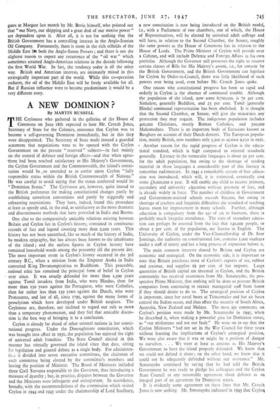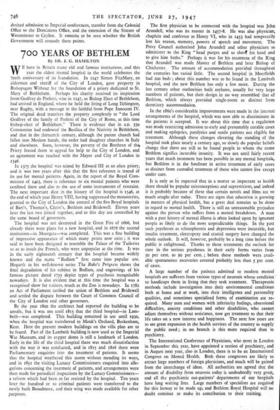A NEW DOMINION?
By MARTIN RUSSELL
THE Ceylonese who gathered in the galleries of the House of Commons on June r8th expected to hear Mr. Creech Jones, Secretary of State for the Colonies, announce that Ceylon was to become a self-governing Dominion immediately, but in this they were disappointed. The Secretary of State made instead a guarded statement that negotiations were to he opened with the Ceylon Government on the present " reserved " subjects—in fact mainly on the control of defence and foreign affairs—and that when agree- -thent had been reached satisfactory to His Majesty's Government, the Ceylon Government and the Commonwealth, the island's consti- tution would be .so amended as to confer upon Ceylon "fully responsible status within the British Commonwealth of Nations." He was careful to avoid saying that the status conferred would be "Dominion Status." The Ceylonese are, however, quite inured to 'the British preference for making constitutional changes partly by establishing unwritten conventions and partly by niggardly and exhausting negotiations. They have, indeed, found this procedure at least as speedy and, in the end, as satisfactory as the more dramatic and discontinuous methods that have prevailed in India and Burma.
One clue to the comparatively amicable relations existing between Britain and Ceylon lies in Ceylon's history, contained in continuous records of fact and legend covering more than 2,000 years. This history has not been unearthed, like so much of the history of India, by modern epigraphy, but has always been known to the inhabitants of the island ; and the earliest figures in Ceylon history have remained household words among the peasantry till the present day. The most important event in Ceylon's history occurred in the 3rd century B.C., when a mission from the Emperor Asoka in India converted King Devanampiyatissa to Buddhism. This peaceable, .rational ethic has remained the principal form of belief in Ceylon ever since. It was stoutly defended for more than 1,500 years against Tamil invaders from India, who were Hindus, then for more than 150 years against the Portuguese, who were Catholics, then for rather less than 150 years against the Dutch, who were Protestants, and last of all, since 1795, against the many forms of proselytism which have developed under British auspices. The Ceylonese are, therefore, not inclined to regard our rule as more than a temporary phenomenon, and they feel that amicable discus- sion is the best way of bringing it to a conclusion.
Ceylon is already far ahead of other oriental nations in her consti- tutional progress. Under the Donoughmore constitution, which was brought into effect in 1931, the population has enjoyed the right of universal adult franchise. The State Council elected in this manner has virtually governed the island since that date, sitting for legislation and general debate as a single body. For administra- tica it divided into seven executive committees, the chairman of each committee being elected by the committee's members and having the position of Minister. The Board of Ministers included three Civil Servants responsible to the Governor, thus introducing a measure of dyarchy ; but, in practice, disputes between the Governor and the Ministers were infrequent and unimportant. In accordance, broadly, with the recommendations of the commission which visited Ceylon in 1944 and 1945 under the chairmanship of Lord Soulbury,
a new constitution is now being introduced on the British model, i.e., with a Parliament of two chambers, one of which, the House of Representatives, will be elected by universal adult suffrage and will have, in relation to the Second Chamber, the Senate, roughly the same powers as the House of Commons has in relation to the House of Lords. The Prime Minister of Ceylon will preside over a Cabinet, and will include Defence and Foreign Affairs in his own portfolio. Although the Governor still possesses the right to reserve certain classes of Bills for His Majesty's assent, i.e., for consent by the British Government, and the British Government can legislate for Ceylon by Order-in-Council, there was little likelihood of such powers ever being used, even before Mr. Creech Jones spoke.
One reason why constitutional progress has been so rapid and orderly in Ceylon is the absence of communal trouble. Although the population of the island, now some 6,700,000, is 70 per cent. Sinhalese, generally Buddhist, and 23 per cent. Tamil (generally Hindu) communal representation has been abolished. It is thought that the Second Chamber, or Senate, will give the minorities any protection they may require. The indigenous population includes 400,000 Christians, mostly Roman Catholics, and 300,000 Mahomedans. There is an important body of Eurasians known as Burghers on account of their Dutch descent. The European popula- tion, mainly British, now numbers only 5,300 as against 9,150 in 1931.
• Another reason for the rapid progress of Ceylon is the educa- tional standard, which is high compared to oriental standards generally. Literacy in the vernacular languages is about 50 per cent. for the adult population, but owing to the shortage of reading material in these languages a considerable part of this literacy is somewhat rudimentary. In 1945 a remarkable system of free educa- tion was introduced, which will, it is estimated, eventually cost some• £6,000,00o a year. It will enable any child to receive primary, secondary and university education without payment of fees, and is already widely in force. The number of children in Government and Government-assisted schools exceeds Soo,000, but owing to shortage of teachers and linguistic difficulties the standard of teaching leaves room for improvement in many schools. Further, although education is compulsory from the age of six to fourteen, there is probably much irregular attendance. The state of secondary educa- tion can perhaps be assessed from the fact that 140,000 people, or about 2 per cent. of the population, are literate in English. The University of Ceylon, under the Vice-Chancellorship of Dr. Ivor Jennings, the authority on constitutional law, contains 1,000 students under a staff of ninety and has a long process of expansion before it.
The main common interests shared by Britain and Ceylon are economic and strategical. On the economic side, it is important to note that Britain purchases most of Ceylon's exports of tea, rubber and coconut, and supplies 19 per cent, of her imports. Large quantities of British capital are invested in Ceylon, and the British community has received assurances from Mr. Senanayeke, the pro- spective Prime Minister, that nothing will be done to prevent British companies from continuing to recruit managerial staff from home if they should desire to do so. The strategical position of Ceylon is important, since her naval bases at Trincomalee and her air bases control the Indian ocean, and thus affect the security of South Africa, Australia, New Zealand and Malaya. The most apt comments on Ceylon's position were made by Mr. Senanayeke in 1945; when he described it, when making a powerful plea for Dominion status, as "our misfortune and not our fault." He went on to say that the Ceylon Ministers "had not sat in the War Council for three years without learning the implications of Ceylon's strategical position. We were also aware that it was or might be a position of danger to ourselves. . . . We were at least as anxious as His Majesty's Government to have the island properly defended. We knew that we could not defend it alone ; on the other hand, we knew that it could not be adequately defended without our assistance." Mr. Senanayeke continued by saying that he had told the British Government he was ready to pledge his colleagues and the Ceylon State Council to any • reasonable agreement about defence as an integral part of an agreement for Dominion status.
It is evidently some agreement on these lines that Mr. Creech, Jones is now seeking. Mr. Senanayeke indicated in 1945 that Ceylo4 desired admission to Imperial conferences, transfer from the Colonial Office to the Dominions Office, and the extension of the Statute of Westminster to Ceylon. It remains to be seen whether the British Government will concede these points.



































 Previous page
Previous page